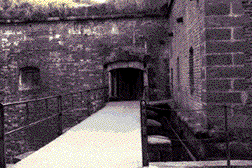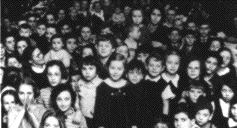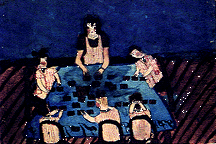|
Origunal Vienna production 1992 -
1995
Book: Alexander Waechter
Lyrics to all song are by inmates of
Theresienstadt
Music: Sergei Dreznin, Gerhard Bronner
as well as "Schlager" of the 1930s and 40s
directed by Alexander Waechter
with Alexander Waechter, Tania Golden
and Sergei Dreznin
Premiere: Vienna Theater im Rabenhof, 8. October
1992
The production toured in Salzburg, Innsbruck, Munich,
Hambourg, Zurich, Berlin,
Karlsruhe, Wiesbaden, Mainz,
Kaiserslauten, Chur and others.
English version
"KAMP!"
Premiere: December 1994, Temple Beth El, Boca
Raton, FL, USA
Book & translations by Thomas & Caren
Neille
directed by Michael Maurer
with Ann Turnoff/Amelia DeMayo &
Curt Buckler
This production was shown in Washington, DC, and at the
Festival of Austrian Jewish Culture in London (South Bank
Center)
the show is currently touring around New Jersey
Upcoming New York
premiere:
April - May 2001, 78th Street Theater
Lab
Book by Shelley Berc & Andrei Belgrader
directed by Andrei Belgrader
Produced by Paul Blackman
|
|
|
 Terezín
(Theresienstadt in German), just north of Prague,
Czechoslovakia, was displayed in 1944 as a model camp to a
group from the International Red Cross who were impressed by
prisoners apparently leading a well-organized life, going
about their daily business, buying and selling with a
special camp currency and enjoying cabaret performances and
classical concerts. There was even a band playing on a
bandstand in an attractive central square. But it was all a
sham to persuade the world that the rumors of a Holocaust
were unfounded. Although it was not a death camp on a par
with Auschwitz, the conditions at "the paradise ghetto" of
Terezin were horrible with overcrowding, poor food,
sanitation and medical care. Of the 140,000 people who were
interned at Terezín, 33,000 died and 87,000 were
transported to Nazi death camps elsewhere. Terezín
(Theresienstadt in German), just north of Prague,
Czechoslovakia, was displayed in 1944 as a model camp to a
group from the International Red Cross who were impressed by
prisoners apparently leading a well-organized life, going
about their daily business, buying and selling with a
special camp currency and enjoying cabaret performances and
classical concerts. There was even a band playing on a
bandstand in an attractive central square. But it was all a
sham to persuade the world that the rumors of a Holocaust
were unfounded. Although it was not a death camp on a par
with Auschwitz, the conditions at "the paradise ghetto" of
Terezin were horrible with overcrowding, poor food,
sanitation and medical care. Of the 140,000 people who were
interned at Terezín, 33,000 died and 87,000 were
transported to Nazi death camps elsewhere.  The irony of Terezin was that cultural
freedom of the large proportion of artists was tolerated and
Jewish "degenerate music" was performed on handmade and
smuggled instruments. Much of the work was hidden in the
attics and cellars of Terezin and recovered after the
Germans left Czechoslovakia and made available after the
opening up of the former Eastern bloc. The irony of Terezin was that cultural
freedom of the large proportion of artists was tolerated and
Jewish "degenerate music" was performed on handmade and
smuggled instruments. Much of the work was hidden in the
attics and cellars of Terezin and recovered after the
Germans left Czechoslovakia and made available after the
opening up of the former Eastern bloc.
TERESIENSTADT BECOMES
CONTEMPORARY MUSICAL THEATER
On October 8, 1992, Vienna was taken by
storm by a small production in Theater im Rabenhof -
Chansons und Satiren aus Theresienstadt.
It was conceived, written and directed by
Alexander Waechter, a prominent Vienna actor, director and
playwright who also costarred in the piece, written for two
actors and a pianist. In this production, based entirely on
poems and cabaret acts written (and mostly performed) by the
inmates of Theresienstadt, Waechter told the story of his
great uncle Remi, Baron von Waechter, whose wife was Jewish
and who was sent with her to Theresienstadt, where he
perished. His wife Emilia was then sent to Auschwitz, and
killed.
Waechter carefully researched the piece,
which was produced by the Vienna Theater in der Josefstadt
(once home of Max Reinhardt). Some of the melodies to songs
were whistled to Waechter by the survivors, some were hits
of the day in Berlin or Prague. Martin Roman, the surviving
leader of the Theresienstadt jazz band, the Ghetto Swingers,
sent Waechter a manuscript of his "Carousel" from his home
in Emerson, NJ. Sergei Dreznin, a Russian-Austrian pianist
and composer had to write music to 8 poems and cabaret
numbers and served as the showís musical director and
pianist. Gerhard Bronner, patriarch of the Vienna
cabaret scene, also wrote new music to some
poems.
The show consisted of 26 songs. Some of the
wittiest lyrics written in German depicted life in the camp,
making fun of the small human weaknesses of the inmates and
of Death itself.
Our performances were accompanied by the
screening of the infamous Nazi propaganda film "The Fuehrer
gives Jews a city" in the theater foyer that also hosted a
large exhibit of the original theater posters, photographs
and children's drawings (some of the former Theresienstadt
children later came to see the show). Many of the art works,
along with poems and articles were reprinted in the
wonderfully published program, which is now in the archives
of many Holocaust research centers throughout the United
States.
The show played in Vienna and was
invited to the best German stages: Berlin, Hamburg, Munich,
Wiesbaden, Zurich, Innsbruck, Salzburg, and many others. A
CD was produced by Bertelsmann Group BMG
Ariola.
Critics in Europe and in the US
unanimously agreed that our production proved the
impossible: that a cabaret about a concentration camp can
make the audience laugh as well as cry, applaud and think of
the unlimited power of human spirit facing horrible
circumstances. ÑThose who seek joy and are not
scared of tears - Go. See it," wrote Vienna daily Die
Presse. Ñ A standing ovation in a packed house!"
(Tiroler Tageszeitung, Innsbruck.)
On a darkened, bare stage, a macabre
revue brings home the fears, desires and dreams of the
prisoners, but also their cynicism and small, human
weaknesses... a worthy, exemplary evening (in which) you
physically feel how the audience stop breathing when
Dreznin's children's songs are played, or Tania Golden sings
the song of a suitcase searching for its owner. Then
laughter returns, almost like liberation, with the cabaret
tale of an unopened package which makes the rounds of the
camp, serving each recipient as a small bribe to win small
privileges (Berliner Morgenpost)
An English version of our show called
KAMP! ? Song and Satire from Theresienstadt in translations
and with a new dialogue by Thomas and Carin Neile was
presented in Boca Raton, FL. It was later invited to the
Austrian Cultural Institute in Washington, DC and was part
of the Festival of the Austrian Jewish Culture in London in
1996.
In Florida as in the showís most
recent performance ? its Tristate area premiere --- in the
Jewish Cultural Center in Tenafly, NJ, (June 2000) the
audience there included many survivors of the Holocaust.
They gave the show a standing ovation. In Tenafly three
former inmates of Theresienstadt then took the stage to
recount their experiences and to praise the courage and
professionalism of the performers.
For the performance schedule and
CD contact Sergei Dreznin at
SDreznin@aol.com
|
|